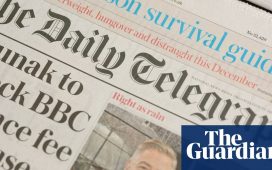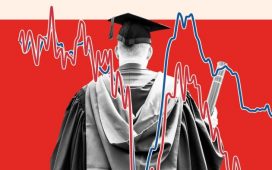Hunt: global AI standards must reflect liberal democratic values.
Jeremy Hunt tells Davos that Western goverments must talk to China about artificial intelligence, and that it is very important that global AI standards reflect liberal democratic values.
He says:
When it comes to setting global AI standards, it’s very important that they reflect liberal democratic values.
But, I think it is really important that we talk to countries like China.
Hunt points out that Sam Altman, alongside him on today’s panel, has a sign in his OpenAI office that says ‘no-one knows the future’.
But, Hunt says, “we do have agency over the future”, and that is why there is tension between the two (AI developers, and policymakers).
Hunt says we are “incredibly lucky” that people like Sam Altman are helping to transform humanity’s prospects for the future.

No-on in the room here in Davos today thinks the world would be better without AI, Hunt argues. “But we have choices”.
Hunt says:
The choice we need to make is how to harness it, so it is a force for good.
I actually think that means talking to countries like China.
One of the ways it would be a force for bad is if it just becmae a tool in a new geo-strategic superpower race, with much of the energy put into weapons rather than things that could transform our daily lives.
One way to avoid that is to have discussions with countries like China over common ground, Hunt says.
He adds that the benefits of AI should be spread throughout the world, and not just concentrated in advance economies.
Hunt says previous technological revolutions, such as the industrial revolution and computer revolution, succeeded where the benefits were spread evenly across society, not concentrated in small groups.
He adds:
Otherwise that will deepen some of the fractures that are already, in my view, taking us in the wrong direction.
Key events
Wheat shipments via the Suez Canal fell by almost 40% in the first half of January to 0.5 million tonnes due to attacks in the Red Sea and Gulf of Aden, the World Trade Organization has revealed, in a post on X (formerly Twitter).
The data was based on a dashboard developed jointly by the International Grains Council (IGC) and the World Trade Organization, the global trade watchdog said.
Ukraine’s foreign minister has revealed that Kyiv is seeking to organize a call with Chinese President Xi Jinping, as it tries to organise a leaders summit to push forward its blueprint for peace.
Foreign Minister Dmytro Kuleba (who called for more air defence help this morning) told Bloomberg TV that the government is pushing for the direct channel between Xi and Ukrainian President Volodymyr Zelenskiy.
“There are things that they can talk about,” Kuleba said in an interview with Bloomberg Television on Thursday.
Zelenskiy’s peace formula is “a way to restore long lasting just peace in Ukraine.” he added.

Douglas Emhoff, the Second Gentleman of the United States, has spoken about the rise in antisemitism today, in Davos.
Appearing on a panel, Emhoff says he had not expected to make antisemitism the focus of his role as America’s the first second gentlemen.
Instead, he expected it would be gender equity, after his wife Kamala Harris became the first female vice-president.
Emhoff says the problem of antisemitism was bad even before the attacks of October 7th, citing the terrorist shooting at the Tree of Life synagogue in Pittsburgh in 2018, and the white supremacists who chanted “Jews will not replace us” at a rally in Charlottesville.
Emhoff says he didn’t experience antisemitism as a child growing up in a mixed neighbourhood in Jersey in the 1970s. But by the time the Biden-Harris administration took office, it was “very much on the radar”
Emhoff says:
It was an epidemic of hate, even back then.
Michal Herzog, the first lady of Israel, is also here – she says she’s “very saddened” that we have to hold a panel on antisemitism here at Davos.
Herzog explains that antisemitism always there, but the October 7th attack has unleashed everything. The masks were taken off.
She adds that the demonstrations in support of Palestinians started even before Israel began “its manoeuvre” in Gaza.
History has shown that hatred of jews has always been “the canary in the coalmine”, she continues, and is followed by attacks on other groups.
And she insists Israel is fighting a “war of values”, for the value of the free world against the world of evil.
Emoff calls it “a crisis of antisemitism since Oct. 7” that has consumed most of what he’s been doing as second gentleman.
“There are far too many people in positions of power in the country, in the world, who shamefully stay silent when noise is required.” pic.twitter.com/aRRDNHPiYv
— Jacob N. Kornbluh (@jacobkornbluh) January 18, 2024
“The antisemitism that spiked in America, in Europe didn’t start when the IDF went into Gaza. It started on Oct. 7.. the bloodiest day in the history of the Jewish people since the Holocaust triggered a wave of bloody actions against Jews around the world” —@JGreenblattADL at WEF pic.twitter.com/4PMCLRZFLe
— Jacob N. Kornbluh (@jacobkornbluh) January 18, 2024
Speaking of trade… former Bank of England governor Mark Carney has warned there is a “relatively high degree of certainty” of further supply chain shocks.
Further supply shocks are coming with “relatively high degree of certainty”, @markjcarney tells #WEF24.
“The world is being rewired. Our trade routes are being rewired through derisking of supply chains; energy systems are being rewired with addressing climate change.” pic.twitter.com/HLblysJ19u
— John Collingridge (@jmcollingridge) January 18, 2024
Carney predicts that the “rewiring of intelligence” will be a positive supply shock later in the decade
— John Collingridge (@jmcollingridge) January 18, 2024
Valdis Dombrovskis, European Commissioner for Trade, pledges that the EU are committed to the rules based multilateral trading system, and are working to preserve it.
He cautions, though, that while Europe will act multilaterally as much as it can, it is prepared to act unilaterally if it must….
Chrystia Freeland, Canada’s finance minister, tells Davos that the environment in 2024 is very different than in 2015 when she was Canada’s trade minister.
One change is the focus on supply chain resilience, which Freeland says is driven by the Covid-19 pandemic and then the Ukraine war.
Appearing on this afternoon’s panel on trade, she explains:
After the shock that we all experienced during Covid with things shut down, our people are just going to demand a little more security in their supply chains.
And then that was multiplied by Russia’s illegal invasion of Ukraine.
Freeland add that the global economy is facing a hugely transformative moment, which is only comparible to the industrial revolution, in terms of the energy transition, and the way manufacturing must be retooled.
She also reveals she spoke yesterday to “a very significant international business leader” who’s also a big investor in Canada. He argued that companies must be careful that decarbonisation does not mean deindustrialization.
Canada, Freeland says, is “absolutely determined” that decarbonisation will mean more jobs, more growth, and more manufacturing.
WTO chief: may miss trade growth forecast for 2024
The head of the World Trade Organisation has warned Davos that trade growth may be weaker than it expected this year.
Speaking on a panel on trade and investment, Ngozi Okonjo-Iweala explains that the WTO is a little less optimistic than it had been, due to the disruption to Red Sea shipping, leading to vessels avoiding the Suez Canal, and also the drought in the Panama Canal.
The WTO had forecast that trade growth would pick up to 3.3% this year, from just 0.8% in 2023.
But, Okonjo-Iweala says uncertainty and the downgrade of global growth will both hit trade. This makes the WTO “slightly less optimistic” about hitting the 3.3% forecast, she says:
I think we’ll come in below that.
The WTO’s forecasts are currently being revised, so she doesn’t have the new numbers yet. And even if there is a cut, it’s still going to be better than last year, Okonjo-Iweala points out.
She also says there are ‘bright spots’ in world trade, including in digital trade and green trade, which has tripled over the last two decades.
Okonjo-Iweala adds:
Yes we are worried, but trade is very resilient, and we are optimistic we can pick up on some bright spots.
Over at Ukraine House, a temporory pop-up in a shop on the Davos promenade, delegates have heard fresh warnings about the dangers of appeasing Russia.
Serhii Plokhii, director of the Ukrainian Research Institute at Harvard University, warned that the world leadership’s policy of appeasing Vladimir Putin led to the war in Ukraine:
Plokhii said:
“The road to this war is very much a story of appeasement. It’s the appeasement of the 1930s replayed in the 1990s and 2000s.
Unfortunately, it’s hard to fully realize this until a catastrophe of such a scale as this war happens, and you get very cautious about using the terms like ‘appeasement’ and parallels with the 1930s.
But having the largest war in Europe since World War II, I’m afraid that we don’t have any other choice but to look back and learn the lessons from the 1930s and 1940s.”
As covered earlier, David Cameron compared the current situation to the 1930s this morning.
Speaking of oil…Iraq is trying to lower its dependency on oil revenues, Davos heard this morning.
Speaking at WEF, Prime Minister Mohammed Shia al-Sudani said Iraq has set a goal in a three-year budget to reduce dependence on oil revenue from 95% to 80%.

IEA sees slower oil demand growth
Jillian Ambrose
Away from Davos, the growth in global oil demand will fall by almost half in the year ahead due to weaker economic signals from China and other major economies, according to the International Energy Agency today.
The IEA’s influential monthly oil market report has found that world’s demand for oil would climb by 1.2m barrels per day this year, compared with an average of 2.3m barrels a day in 2023.
Meanwhile, the world’s oil supply is forecast to rise by 1.5m barrels a day to a new high of 103.5m b/d, fuelled by record-setting output from the US, Brazil, Guyana and Canada.
The IEA said that if the Opec oil cartel abandons its policy to hold back oil supply from the market it could create a “substantial surplus” of crude in the market, which would likely weigh down market prices.
The global oil price rose slightly, to around $78.26 a barrel, following the IEA’s report which lifted the group’s oil demand growth forecasts by 180,000 barrels a day from its previous projection.
The oil price remains well below the 2023 average of $84.50 a barrel despite ongoing sanctions against Russian oil exports, the Israel-Gaza conflict and shipping disruptions through the Red Sea.
The Davos session on artificial intelligence wrapped up with a nod to the elephant in the room – Sam Altman’s shock dismissal from OpenAI last year, and his rehiring a few days later, after a staff revolt and support from major investor Microsoft.
Q: what did you learn from the most widely publiced boardroom scandal in recent decades?
Altman takes a moment to think what he can say about a tumultuous few days in which he was fired, then hired by Microsoft, then returned to OpenAI while most of the board who had sacked him departed.
He spreads his arms and declares:
At some point you just have to laugh, at some point it just gets so ridiculous.
One lesson, he says is that “you shouldn’t leave important but not urgent problems dangling”.
He says OpenAI knew its board was too small, and didn’t have the level of experience we needed [which was resolved through the deal to bring Altman back].
But more importantly, he says, as the world gets closer to AGI [Artificial general intelligence] the stakes, the stress, the level of tension is going to go up.
He explains:
“Every one step we take closer to very poweful AI, everyone’s character gets +10 crazy points.
It’s a very stressful thing, and it should be, because we’re trying to be responsible about very high stakes.”
Altman adds that he expects “more strange things”, as the world gets closer to very powerful AI.
So it’s verty important to have more preparation, more resilience, more time thinking about what can go wrong.
Altman adds that the most important he learned was the strength of his team.









